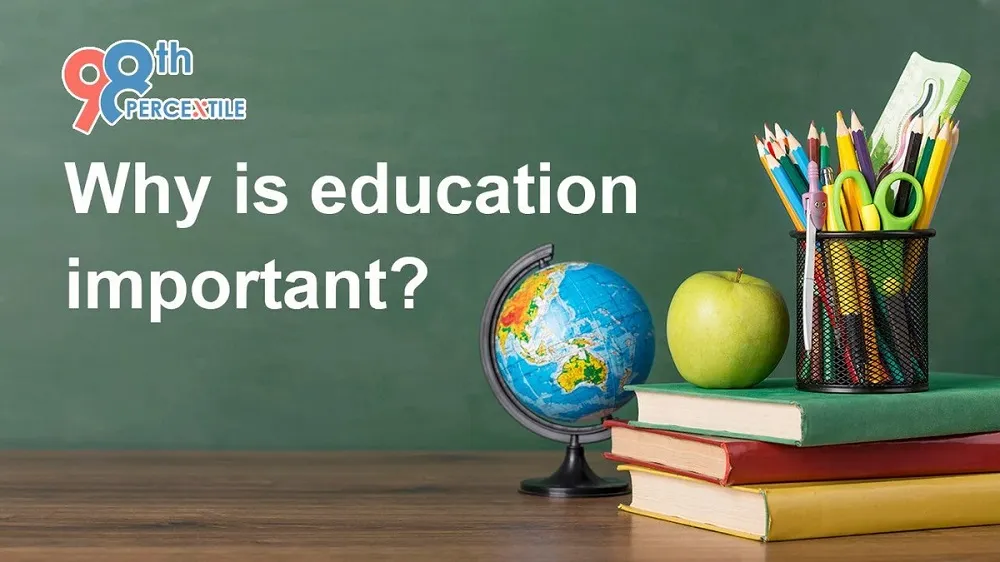Education
The Lifelong Benefits of Education: A Comprehensive Overview

Education is often considered one of the most valuable assets a person can acquire. Beyond the classroom, education shapes individuals, communities, and entire societies, laying the groundwork for personal growth, economic prosperity, and societal progress. From early childhood through adulthood, the benefits of education extend far beyond academic achievement, influencing every aspect of our lives. In this comprehensive overview, we’ll explore the lifelong benefits of education and examine how investing in learning can yield dividends that last a lifetime.
Foundation for Personal Development:
Education serves as the foundation for personal development, providing individuals with the knowledge, skills, and capabilities they need to navigate the complexities of the modern world. From basic literacy and numeracy to critical thinking and problem-solving, education equips individuals with the tools they need to succeed in life. Moreover, education fosters a love of learning and a spirit of curiosity that can drive continuous growth and self-improvement throughout life.
Economic Empowerment:
One of the most widely recognized benefits of education is its role in promoting economic empowerment and social mobility. Individuals with higher levels of education tend to have access to better job opportunities, higher incomes, and improved quality of life. Education opens doors to a wide range of career paths and professions, allowing individuals to pursue their passions and interests while also providing for themselves and their families.
Furthermore, education can break the cycle of poverty and inequality by providing disadvantaged individuals with the skills and knowledge they need to improve their circumstances. By investing in education, societies can create pathways for upward mobility and ensure that all members have the opportunity to fulfill their potential, regardless of their background or circumstances of birth.
Health and Well-being:
Education is closely linked to better health outcomes and overall well-being. Studies have shown that individuals with higher levels of education tend to lead healthier lifestyles, make better health-related decisions, and have lower rates of chronic disease and mortality. Education equips individuals with the knowledge and skills they need to understand health information, access healthcare services, and make informed choices about their well-being.
Moreover, education can empower individuals to advocate for their health needs, engage in preventive behaviors, and navigate the complexities of the healthcare system. By promoting health literacy and fostering a culture of wellness, education plays a critical role in improving health outcomes and reducing health disparities across populations.
Social Cohesion and Civic Engagement:
Education is a powerful tool for promoting social cohesion, fostering empathy, and building understanding across diverse communities. In today’s multicultural and globalized world, it’s more important than ever to cultivate an appreciation for diversity and a respect for different perspectives and cultures. Education provides a platform for individuals to learn about the world around them, challenge stereotypes and prejudices, and build meaningful connections with people from diverse backgrounds.
Through education, individuals develop the knowledge, skills, and attitudes necessary to engage constructively with others, resolve conflicts peacefully, and promote social justice and equality. By fostering a culture of respect, tolerance, and inclusion, education helps build cohesive and resilient communities that can thrive in an increasingly interconnected and interdependent world.
Lifelong Learning and Adaptability:
Perhaps one of the most significant benefits of education is its capacity to foster lifelong learning and adaptability. In today’s rapidly changing and uncertain world, the ability to learn, unlearn, and relearn is essential for success. Education instills a love of learning and a growth mindset that encourages individuals to seek out new knowledge, acquire new skills, and adapt to changing circumstances throughout life.
Moreover, education equips individuals with the critical thinking, problem-solving, and communication skills they need to thrive in a variety of contexts and roles. Whether in the workplace, the community, or the home, lifelong learners are better equipped to navigate complexity, embrace innovation, and seize opportunities for personal and professional growth.
Conclusion:
The benefits of education are profound and far-reaching, extending across every stage of life and influencing every aspect of our society. From fostering personal development and economic empowerment to promoting health and well-being, social cohesion, and lifelong learning, education is a powerful force for positive change. By investing in education, individuals, communities, and nations can unlock the full potential of every individual, build more inclusive and resilient societies, and create a brighter and more prosperous future for all.
Education
RUB Ranking: A Reliable Measure of Academic Excellence

What is the RUB Ranking?
The RUB Ranking, which stands for “Investigate College Benchmarking,” is a comprehensive degree that assesses the scholastic quality, inquire about yield, and generally notoriety of colleges around the world. Not at all like other rankings that may center fundamentally on understudy fulfillment, budgetary assets, or graduated class victory, the RUB Ranking places a noteworthy accentuation on investigate efficiency, workforce ability, and scholastic contributions. The RUB Ranking is outlined to give an exact reflection of an institution’s commitment to progressing information and cultivating mental development. It employments different pointers, counting inquire about financing, quotation affect, and the university’s commitment to logical headway. It too takes into account the quality of instruction and instructing, guaranteeing that understudies are accepting an instruction that is grounded in current, cutting-edge research.Key Components in the RUB Ranking System
The RUB Ranking is not based on a single measure. Instep, it is determined from numerous components that collectively shape a all encompassing see of a university’s scholarly execution. A few of the key variables utilized in deciding the RUB Ranking include:1. Investigate Output
One of the essential drivers of the RUB Ranking is the inquire about yield of a college. This incorporates both the amount and quality of the investigate created by staff individuals and understudies. Colleges that reliably distribute high-impact inquire about in top-tier diaries tend to rank higher in the RUB framework. Inquire about yield is regularly measured in terms of the number of distributed papers, books, and conference procedures, as well as the number of citations those works receive.2. Investigate Funding
Universities that secure considerable investigate subsidizing from government organizations, private establishments, and industry accomplices are considered to be at the cutting edge of scholarly and logical progression. Financing permits colleges to back groundbreaking inquire about ventures, pull in best analysts, and offer state-of-the-art offices for their scholarly communities. As a result, colleges with higher investigate subsidizing regularly score way better in the RUB Ranking.3. Quotation Impact
Citation affect measures the impact and reach of a university’s inquire about. Citations are an critical metric of insightful victory, as they illustrate how regularly other analysts allude to a university’s work. Tall quotation affect demonstrates that a university’s inquire about is having a critical impact in its field. This figure is especially vital in the RUB Ranking, as it reflects the worldwide acknowledgment and pertinence of the university’s contributions.4. Scholastic Reputation
The RUB Ranking moreover considers the scholarly notoriety of an institution, which is based on studies conducted among scholastics and analysts around the world. This notoriety is affected by the quality of inquire about, the skill of workforce individuals, and the by and large glory of the college inside the scholastic community. Colleges that are well-regarded by their peers tend to perform way better in the RUB Ranking, as their inquire about is seen as definitive and impactful.5. Staff Expertise
The skill of staff individuals is another significant figure in the RUB Ranking. Colleges with workforce individuals who are recognized as pioneers in their areas, have significant scholarly involvement, and contribute to cutting-edge investigate are likely to rank higher. Workforce skill is regularly surveyed by looking at the scholastic capabilities, distribution records, and association in major inquire about ventures of teachers and analysts at the university.6. Universal Collaboration
In today’s globalized scholarly environment, worldwide collaboration plays a imperative part in the victory of colleges. The RUB Ranking assesses the level of worldwide collaboration a college has, counting joint inquire about ventures, associations with other teach, and the worldwide versatility of understudies and workforce. Colleges that cultivate a collaborative, universal environment tend to be more inventive and powerful, which emphatically impacts their ranking.7. Instructing and Learning Quality
While the RUB Ranking is fundamentally research-focused, the quality of instructing and learning too plays a part in deciding a university’s position in the positioning. This incorporates components such as the instructing staff’s capabilities, student-to-faculty proportions, and the accessibility of cutting edge learning assets. Colleges that prioritize high-quality instruction and make an environment conducive to learning are esteemed in the RUB Ranking system.Why RUB Ranking is Considered a Dependable Degree of Scholarly Excellence
The RUB Ranking is broadly respected as one of the most dependable measures of scholastic fabulousness for a few reasons. To begin with, it is established in objective, data-driven criteria that reflect the center components of scholastic execution. By assessing colleges on their investigate yield, subsidizing, citations, and notoriety, the RUB Ranking gives an exact and comprehensive evaluation of a university’s standing in the worldwide scholastic landscape.1. Accentuation on Inquire about Productivity
Unlike a few other college positioning frameworks, which may grant more weight to components like money related assets or campus comforts, the RUB Ranking places a solid accentuation on investigate efficiency. Investigate is a foundation of scholastic greatness, and colleges that exceed expectations in creating high-quality inquire about tend to make noteworthy commitments to their areas. By prioritizing inquire about, the RUB Ranking highlights teach that are pushing the boundaries of information and innovation.2. Comprehensive Assessment Criteria
The RUB Ranking stands out since it takes into account a wide run of variables that influence a university’s scholastic execution. Inquire about yield, staff ability, notoriety, and worldwide collaboration are all considered when deciding the positioning. This comprehensive assessment guarantees that colleges are evaluated comprehensively and not fair on a single measurement of their operations.3. Worldwide Reach and Recognition
The RUB Ranking is recognized globally and has a worldwide reach. By assessing colleges from all over the world, it gives a worldwide benchmark for scholastic greatness. Teach that rank exceedingly in the RUB framework are regularly recognized as pioneers in their areas, drawing in top-tier analysts, understudies, and subsidizing from around the world.4. Straightforward and Data-Driven
The RUB Ranking is based on irrefutable information and clear techniques, making it a straightforward degree of scholarly brilliance. The utilize of objective measurements such as quotation affect and investigate subsidizing guarantees that the positioning is not subject to predispositions or subjective conclusions. This straightforwardness is a key reason why the RUB Ranking is considered a dependable and trusted source of information.Impact of RUB Ranking on Universities
The RUB Ranking has critical suggestions for colleges. High-ranking educate frequently involvement a assortment of benefits, including:1. Expanded Glory and Reputation
Universities that rank exceedingly in the RUB framework frequently appreciate expanded distinction and worldwide acknowledgment. This can offer assistance draw in beat workforce, analysts, and understudies, making a ethical cycle of scholarly brilliance. A tall RUB Ranking moreover upgrades a university’s notoriety, making it more appealing to potential givers, government bodies, and inquire about financing agencies.2. Pulling in Inquire about Funding
A higher RUB Ranking can too lead to expanded investigate subsidizing. Government offices, private establishments, and industry accomplices are more likely to contribute in colleges that have a solid investigate track record and a tall positioning. This subsidizing empowers colleges to proceed their inquire about activities and contribute in state-of-the-art offices and equipment.3. Superior Universal Collaboration Opportunities
Universities with tall RUB Rankings frequently discover it simpler to set up worldwide collaborations with other top-tier teach. These organizations can lead to joint investigate ventures, trade programs, and get to to unused subsidizing sources. Universal collaboration too improves the university’s worldwide notoriety and gives openings for staff and understudies to lock in with researchers from around the world.4. Progressed Understudy Recruitment
Students are regularly drawn to colleges with solid scholastic notorieties, and the RUB Ranking plays a pivotal part in drawing in imminent understudies. Colleges that rank well in the RUB framework are seen as advertising high-quality instruction and inquire about openings, which can make them more engaging to understudies both locally and internationally.Conclusion
In conclusion, the RUB Ranking is a solid and comprehensive degree of scholarly brilliance. By centering on basic pointers such as investigate yield, subsidizing, quotation affect, and workforce mastery, the RUB Ranking gives a all encompassing see of a university’s scholarly standing. Its straightforward, data-driven strategy guarantees that it is a trusted source for assessing colleges, advertising profitable experiences to understudies, workforce, and analysts alike. As colleges proceed to endeavor for greatness in instruction and inquire about, rankings like the RUB Ranking will play an progressively imperative part in forming the scholarly scene. Whether you’re a planned understudy looking for the best instructive openings or a analyst looking for a collaborative institution, the RUB Ranking offers a important apparatus for making educated choices approximately higher instruction.Read More latest Posts
Education
How PTSO Meaning Enhances School Collaboration

What is the PTSO?
Before plunging more profound into the benefits of the PTSO Meaning, it’s vital to get it its foundational reason. The PTSO is a collaborative organization that includes three basic parties: guardians, instructors, and understudies. It is planned to encourage communication and collaboration between these bunches to guarantee a more all encompassing instructive encounter. The PTSO ordinarily holds customary gatherings, organizes occasions, and partakes in gathering pledges endeavors to bolster school exercises and projects. While numerous schools have a Parent-Teacher Affiliation (PTA), which centers primarily on parent-teacher collaboration, the consideration of understudies in the PTSO includes a one of a kind component. Understudies are given a voice in school choices, permitting them to take an interest effectively in their claim instructive travel. This incorporation reinforces the association between the school, guardians, and understudies, making an environment where each party is contributed in the victory of the other.Enhancing Communication Between Guardians and Teachers
Effective communication between guardians and instructors is one of the foundations of the PTSO Meaning. In numerous conventional instructive frameworks, there can be a detach between domestic and school life, with guardians and instructors frequently working in silos. This isolate can lead to mistaken assumptions, missed openings for bolster, and less-effective learning encounters for students. The PTSO makes a difference break down these obstructions by giving a organized stage for customary communication. Guardians and instructors are empowered to share data almost understudy advance, challenges, and accomplishments in a more collaborative way. Standard gatherings and occasions make openings for guardians to lock in with instructors in a significant way, learning almost classroom flow, instructing techniques, and understudy needs. Moreover, PTSO gatherings regularly serve as a gathering for examining school arrangements and instructive objectives. This level of straightforwardness guarantees that guardians are well-informed and can advocate for their children viably. Instructors, on the other hand, pick up important bits of knowledge into the domestic life of their understudies, permitting them to alter their educating strategies to way better suit person needs. The result is a association that advances scholastic victory and individual development for students.Empowering Understudies Through Participation
One of the most noteworthy perspectives of the PTSO Meaning is the incorporation of understudies in decision-making forms. In numerous schools, understudies are regularly seen as detached beneficiaries of instruction, with small to no say in how the school is run or how they learn. The PTSO demonstrate challenges this standard by effectively including understudies in school exercises, administration, and events. Students in PTSOs are given openings to serve on committees, take part in school occasions, and lock in in talks almost issues that specifically affect their instruction. This enables them to take possession of their learning encounter, building a sense of obligation and administration. It moreover makes a difference understudies feel more associated to the school community, cultivating a sense of having a place and pride in their institution. When understudies are included in the decision-making prepare, they are more likely to feel persuaded and locked in in their instruction. This association energizes them to take an dynamic part in their scholastic advance, look for out bolster when required, and contribute emphatically to the school environment. Furthermore, understudies who are engaged through PTSO inclusion regularly create profitable life aptitudes, such as communication, cooperation, and problem-solving, which serve them well both interior and exterior the classroom.Strengthening the School Community
One of the most discernible benefits of the PTSO Meaning is its capacity to fortify the school community. By bringing together guardians, instructors, and understudies, the PTSO cultivates a sense of solidarity and shared duty. Schools are no longer separated situations but or maybe collaborative spaces where everybody plays a part in forming the instructive experience. The sense of community made by the PTSO expands past the dividers of the school. Guardians, instructors, and understudies frequently work together on occasions, ventures, and activities that advantage the whole school. These exercises might incorporate gathering pledges for extracurricular programs, organizing school-wide occasions such as soul weeks or ability appears, and indeed executing community benefit ventures. These endeavors offer assistance construct a more grounded bond among all school individuals, making a positive and strong atmosphere. A well-supported school community too amplifies its impact past the school, emphatically affecting the encompassing neighborhood. When guardians and instructors collaborate to move forward the school encounter, they illustrate their commitment to the more extensive community, frequently empowering nearby businesses, organizations, and inhabitants to get included. This broader collaboration makes a difference make a strong bolster organize that can encourage enhance the school environment.Improving Understudy Engagement and Achievement
When guardians, instructors, and understudies work together through a PTSO, the collective center on understudy victory leads to progressed scholastic results. Thinks about have appeared that understudies perform way better scholastically when their guardians are effectively included in their instruction. By cultivating communication and collaboration, the PTSO demonstrate guarantees that guardians are well-informed and can give the back their children require at domestic. Instructors too advantage from knowing that guardians are locked in and contributed in their children’s learning, empowering them to give more custom fitted bolster in the classroom. Furthermore, the consideration of understudies in the PTSO implies that understudies are more likely to feel spurred and contributed in their instruction. When understudies are engaged to take an interest in school decision-making, they feel a more prominent sense of possession over their learning. This frequently leads to expanded engagement, way better participation, and a more positive demeanor toward schoolwork. The PTSO demonstrate too gives extra assets and openings for understudies, such as grants, extracurricular exercises, and career improvement programs. By collaborating with guardians and instructors to secure financing, PTSOs can guarantee that understudies have get to to a well-rounded instructive encounter that amplifies past the classroom. These extra openings can offer assistance understudies create modern aptitudes, investigate their interface, and gotten to be more well-rounded individuals.Fundraising and Asset Allocation
Another key work of the PTSO is its part in gathering pledges and asset assignment. Numerous schools depend on outside subsidizing and gifts to bolster extracurricular exercises, extraordinary ventures, and office advancements. PTSOs are frequently instrumental in organizing gathering pledges occasions, such as prepare deals, barters, and fun runs, which raise cash for the school community. Through their collaborative endeavors, guardians, instructors, and understudies can guarantee that stores are apportioned in a way that benefits the whole school. PTSO association makes a difference schools prioritize their budgetary needs and apportion assets viably, guaranteeing that understudies have get to to the programs and openings they require to succeed. In a few cases, PTSOs can too secure gifts or gifts from nearby businesses and organizations. This broadens the scope of accessible assets, empowering schools to upgrade their instructive offerings and move forward offices. By pooling their assets, the PTSO can guarantee that understudies have the apparatuses and back they require to flourish scholastically and socially.Encouraging Long-Term School Improvement
The long-term affect of the PTSO Meaning is its commitment to supported school advancement. By making a culture of collaboration, straightforwardness, and common bolster, PTSOs lay the basis for progressing positive changes inside the school community. As guardians, instructors, and understudies work together to address challenges, celebrate triumphs, and share thoughts, they make an environment of persistent improvement. Moreover, the PTSO’s part in cultivating authority, communication, and problem-solving abilities prepares future eras with the instruments they require to be dynamic, locked in citizens. These abilities are transferable past the school environment, empowering understudies to ended up pioneers in their communities and workplaces.Conclusion
The PTSO Meaning goes past fair being an acronym—it speaks to a collaborative approach to instruction that improves communication, engagement, and in general school culture. By bringing together guardians, instructors, and understudies, PTSOs make a effective organize of bolster that emphatically impacts understudy accomplishment, well-being, and individual growth. From reinforcing the school community to moving forward scholastic results, the PTSO demonstrate illustrates the control of collaboration in instruction. As schools proceed to advance, the significance of such organizations will as it were develop, making a difference understudies, guardians, and instructors work together to make a brighter future for all. The inclusion of each bunch is crucial in making a positive instructive encounter that plans understudies for victory in the classroom and past.Read More latest Posts
Education
MyPascoConnect Parent Login: Stay Connected to Your Child’s Progress

What is MyPascoConnect Parent Login?
MyPascoConnect Parent Login is an online entrance given by the Pasco District School Locale to encourage simple get to for guardians to see vital data around their child’s scholastic execution. The stage is outlined to cultivate communication between guardians, understudies, and teachers, advertising a run of highlights that permit guardians to track grades, participation, assignments, and more. Whether you’re looking for real-time upgrades on homework assignments, understanding your child’s by and large execution in school, or basically keeping tabs on school occasions and declarations, MyPascoConnect Parent Login gives all the apparatuses you require in one helpful location.How to Get to MyPascoConnect Parent Login
To get to the MyPascoConnect Parent Login, take after these straightforward steps: Visit the MyPascoConnect Site: Go to the official MyPascoConnect entry at https://mypascoconnect.com. This is the to begin with step in getting to your child’s scholastic information. Enter Your Qualifications: If you are a unused client, you will require to make an account. If you as of now have an account, basically enter your username and watchword to log in. Guardians who are unused to the stage ought to counsel with their child’s school for informational on how to enroll for a parent account. Set Up Two-Factor Verification (Discretionary): For additional security, MyPascoConnect may inquire you to set up two-factor confirmation (2FA). This highlight gives an included layer of assurance to guarantee your account remains secure. Explore the Dashboard: Once logged in, you’ll be coordinated to the dashboard where you can see your child’s scholarly advance, track participation, survey assignments, and more. Log Out After Utilize: Continuously keep in mind to log out of the entry once you are wrapped up getting to the data to secure your account from unauthorized access.Key Highlights of MyPascoConnect Parent Login
The MyPascoConnect Parent Login offers a extend of highlights that offer assistance guardians remain locked in in their child’s instruction. A few of the most advantageous perspectives of the stage include:1. Real-Time Scholarly Monitoring
The most critical highlight of MyPascoConnect Parent Login is its capacity to give real-time get to to your child’s scholastic advance. This incorporates up-to-date data on: Grades: You can track your child’s grades for each subject or course, making a difference you distinguish any zones where they may require extra bolster or improvement. Assignments: See which assignments your child has completed and which ones are still pending, as well as any up and coming due dates. This highlight is fundamental for remaining on best of your child’s homework and guaranteeing that they are assembly deadlines. Tests and Tests: The stage too permits you to check scores for any tests or tests your child has taken, giving understanding into their qualities and zones that require more attention.2. Participation Tracking
Another valuable include of MyPascoConnect Parent Login is the capacity to screen your child’s participation. The framework shows any nonattendances, lateness, or early expulsions, making a difference you remain educated approximately your child’s participation history. Normal participation is pivotal to scholastic victory, and this apparatus makes it simple to remain on beat of any potential issues.3. Communication with Teachers
Through the MyPascoConnect Parent Login, guardians can communicate straightforwardly with instructors. This communication include encourages collaboration between guardians and teachers, which is imperative for tending to any concerns around your child’s execution or behavior. Guardians can send messages, plan gatherings, and remain in touch with instructors all through the school year.-
Understudy Plan and Calendar
5. School Declarations and News
MyPascoConnect Parent Login moreover gives get to to imperative school-wide declarations. Whether it’s around school closures, parent-teacher conferences, or extracurricular exercises, guardians can remain educated almost what’s happening in their child’s school. This highlight guarantees that you never miss basic overhauls from the school district.6. Uncommon Instruction Support
For guardians of children with extraordinary needs, MyPascoConnect gives get to to assets and upgrades related to their child’s Individualized Instruction Arrange (IEP) or 504 Arrange. This include is planned to guarantee that understudies who require extra bolster in the classroom get the essential lodging and services.7. Review History and Advance Reports
MyPascoConnect too gives verifiable information on your child’s scholastic execution. This permits you to track advance over time, distinguish patterns in their grades, and evaluate whether their scholastic accomplishments are progressing or declining. The capacity to see advance reports gives guardians the setting they require to lock in in important discussions with their children almost their performance.Benefits of Utilizing MyPascoConnect Parent Login
-
Expanded Parental Involvement
2. Improved Communication Between Guardians and Teachers
MyPascoConnect serves as a coordinate communication interface between guardians and instructors. This opens up channels for guardians to ask approximately their child’s advance, share concerns, and work together with teachers to make the best arrange for their child’s victory. The capacity to communicate specifically with instructors guarantees that guardians are continuously in the loop.3. Comfort and Accessibility
The MyPascoConnect Parent Login is open 24/7 from any internet-connected gadget. Whether you’re at domestic, at work, or on the go, you can effortlessly check your child’s scholastic advance, track assignments, or communicate with instructors at your convenience.4. Convenient Updates
The real-time information accessible on MyPascoConnect implies that guardians no longer have to hold up for report cards to evaluate their child’s scholastic standing. If there’s an issue or concern, guardians can address it promptly or maybe than holding up for the following planned assembly or update.5. Personalized Learning Support
By utilizing the stage to track your child’s execution, you can give personalized scholastic bolster. Whether it’s making a difference with homework, planning coaching sessions, or talking about ways to make strides, MyPascoConnect guarantees that you can tailor your inclusion based on your child’s needs. Troubleshooting Common Issues with MyPascoConnect Parent Login While MyPascoConnect is an easy-to-use device, a few guardians may encounter issues when logging in or utilizing the stage. Here are a few common investigating tips:1. Overlooked Secret word or Username
If you disregard your login qualifications, the entrance offers a secret word recuperation alternative. Essentially tap on the “Forgot Password” interface on the login page and take after the enlightening to reset your password.2. Account Lockout
If your account gets bolted due to numerous off base login endeavors, contact the school district’s IT back group to offer assistance open your account and recapture access.3. Specialized Difficulties
Occasionally, you may encounter issues with stacking or getting to certain highlights of the entry. In such cases, attempt reviving the page, clearing your browser cache, or getting to the stage from a distinctive gadget. If the issue endures, contact specialized back for assist assistance.Conclusion
The MyPascoConnect Parent Login is an important asset for guardians who need to remain associated to their child’s instruction and effectively take part in their scholastic travel. By giving simple get to to grades, participation, assignments, and communication with instructors, the entry enables guardians to bolster their children in their instructive endeavors. Whether you’re following grades or planning a assembly with a educator, MyPascoConnect guarantees that you have the data you require to offer assistance your child succeed in school. With its user-friendly interface, real-time upgrades, and helpful availability, MyPascoConnect Parent Login is a device that each parent in Pasco District can advantage from, guaranteeing that they stay effectively locked in in their child’s advance and in general school encounter.Read More latest Posts
-

 Travel1 year ago
Travel1 year agoOnboardicafe.com Login Exploring the Delights of Onboardicafe
-

 Food & Recipes12 months ago
Food & Recipes12 months agoFive Food Products You Must Avoid Giving to Your Infant
-

 Sports1 year ago
Sports1 year agoThe Most Popular Sports In The World
-

 Health & Fitness10 months ago
Health & Fitness10 months agoSuboxone Tooth Decay Lawsuits and the Pursuit of Justice Against Indivior
-

 Sports9 months ago
Sports9 months agoSmart Solutions for Football Field Maintenance
-

 Entertainment1 year ago
Entertainment1 year agoNavigating the Web: The Ultimate List of Tamilrockers Proxy Alternatives
-

 Technology4 months ago
Technology4 months agoSustainable Practices in Video Production: Reducing the Carbon Footprint
-

 Sports9 months ago
Sports9 months agoWearable Tech and the Future of Football










